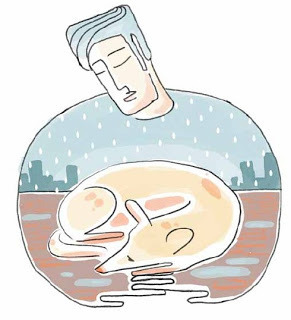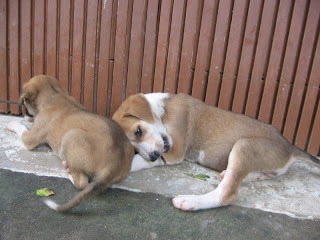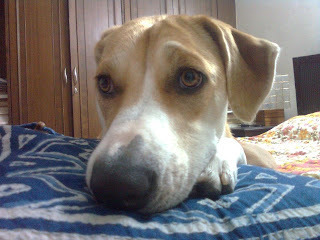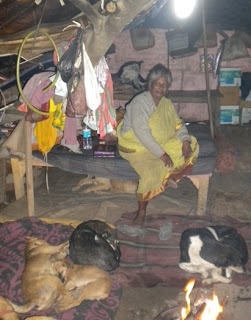Fox troth - a column about hidden senses

[Did a version of this piece for Kindle magazine’s anniversary issue about sensory experiences that sometimes remain hidden from us, or that we don’t open ourselves to. I hadn’t intended to write about Foxie for a while – not for official publication anyway – but this seemed to fit the subject, so I drew on some of the things I have written earlier. The magazine website is here, and the illustration on the left is by Soumik Lahiri]
----------
It was a magical moment, one I often relive and dwell on. One afternoon in July 2008, walking towards a rough lane behind our building to check on our water booster, I saw a litter of six tiny puppies sleeping together. Perhaps it’s relevant that I didn’t see them from a safe distance – they seemed to materialise right under my nose; I might have stepped on one of them if my eyes hadn’t been on the ground.
What I felt in those first few seconds was generic concern (I didn’t know yet that the pups’ mother was nearby, and that they were being looked after by two kindly watchmen) and perhaps the briefest tug of a heart-string. At this point I couldn’t even see them as individuals, just as a huddled-together mass of vulnerable, twitching life. Even over the next few days, as my mother, wife and I began visiting the lane, taking across milk and bread, helping the watchmen cope, I couldn’t have imagined that one of those little creatures would become mine in the truest, deepest sense of the word – not my “pet” but in nearly every way that mattered, my child – and that the next few months would see the opening up of senses and feelings that I didn’t know existed.
 I could write a book, or five, on the years that followed, but here’s a summary. We got a couple of the pups adopted, three others succumbed to infection and to the wheels of careless or callous drivers, and we took in the last remaining one, who became our Foxie. Though a strong and hugely energetic dog at first, she spent the second half of her short life afflicted by an intestinal condition that necessitated monitoring her diet carefully, providing medicines with each meal, cleaning up after her six or seven times a day, and watching the accumulation of side-effects: she became ill-tempered during the bad phases, suffered from pain in her hind legs, was so emaciated that most of her ribs showed, and when I took her for a walk downstairs she spent her time not running around after a ball as she once had but sniffing around for the sort of food we had to deny her at home. Then, just when it seemed her condition had stabilised and she was regaining the old spirit, she passed away on the doctor’s table last year, aged barely four.
I could write a book, or five, on the years that followed, but here’s a summary. We got a couple of the pups adopted, three others succumbed to infection and to the wheels of careless or callous drivers, and we took in the last remaining one, who became our Foxie. Though a strong and hugely energetic dog at first, she spent the second half of her short life afflicted by an intestinal condition that necessitated monitoring her diet carefully, providing medicines with each meal, cleaning up after her six or seven times a day, and watching the accumulation of side-effects: she became ill-tempered during the bad phases, suffered from pain in her hind legs, was so emaciated that most of her ribs showed, and when I took her for a walk downstairs she spent her time not running around after a ball as she once had but sniffing around for the sort of food we had to deny her at home. Then, just when it seemed her condition had stabilised and she was regaining the old spirit, she passed away on the doctor’s table last year, aged barely four.It was the most devastating thing I have ever faced (and even that is such an understatement, it feels almost indecent to write the sentence). Yet her short life had opened new doors of perception and feeling for me. Back in 2008, if asked, I would casually have called myself an animal lover; today I realise how misleading that would have been, and how much I still had to learn. Ever since childhood, with my mother's encouragement, I had a basic interest in other life forms, at least the ones that humans find it easy to relate to – asked what I wanted to be when I grew up, I would reply “a vet”. But the only animals I had been genuinely close to earlier had been cats, who are relatively distanced and independent, and perhaps this was a reflection of my own personality.
Fox was introverted too, by dog standards that is, but my years with her provided another dimension of experience. They taught me in the most immediate terms what it meant to be in communion with another, emotionally demonstrative being – to pick up on aspects of personality and feeling – even when verbal communication is out of the equation. And there was a practical component to the relationship that made it especially deep. Working out of home, I was around her most of the time during the long months of her illness, and my daily routine centered around her needs. I was a more hands-on, invested parent than most of the fathers of human children I know – and even some of the mothers.
I should stress that the intensity of this relationship was very much an individual thing: it hasn’t translated into comparably strong feelings for other dogs. More than a year after she went, the grieving process is still very much on. I still feel incomplete and numb, struck by panic each time I think of those last moments in the vet’s clinic; I have regular nightmares about being on a narrow ledge at a great height with her in my arms, being unsure I can hold on to her and maintain my balance at the same time. And I don’t think I can take on another such responsibility, or make such a strong emotional commitment, in the near future. But my time with her did, in a more abstract sense, heighten my sensitivity towards non-human life. The experience has been one of empathy-creation – the sort of feeling where I might see an emaciated dog with a scared, hunted look in its eyes scavenging for food on the streets and think to myself with a shudder, “That could so easily have been my Foxishka, if I had never seen that litter in the lane, or if we had been a little less concerned or more casual.” Such a notion is unthinkable, but I think it all the time.
 Since Fox had a somewhat unusual, elongated body structure and because she stretched out in odd positions, we used to joke that she was many animals in one. When she nibbled on leaves with her ears down, she resembled a goat. Lying on the floor with her arms spread out ahead and her legs on the side, she could seem reptilian: lizard-like or dinosaur-like. There was an odd, camel-like undulation in her movement at other times, and she was a race-horse when she galloped in circles around the park in those precious, much-too-brief early months. When I watched news coverage of the “psychic” octopus Paul, I could imagine a skilled cartoonist drawing a picture of an octopus with a round Foxie head, the eyebrows raised dolefully. I haven’t come close to bonding with any of these creatures, but thanks to her I feel like I know them all a little better.
Since Fox had a somewhat unusual, elongated body structure and because she stretched out in odd positions, we used to joke that she was many animals in one. When she nibbled on leaves with her ears down, she resembled a goat. Lying on the floor with her arms spread out ahead and her legs on the side, she could seem reptilian: lizard-like or dinosaur-like. There was an odd, camel-like undulation in her movement at other times, and she was a race-horse when she galloped in circles around the park in those precious, much-too-brief early months. When I watched news coverage of the “psychic” octopus Paul, I could imagine a skilled cartoonist drawing a picture of an octopus with a round Foxie head, the eyebrows raised dolefully. I haven’t come close to bonding with any of these creatures, but thanks to her I feel like I know them all a little better.All that said, I don’t want to get over-sentimental about the idea of dogs as creatures whose inner lives are exactly comparable to ours. It’s natural enough for animal-lovers to project their own thoughts and emotions onto their pets, and in principle this can be a good thing: an extreme version of the empathy that allows us to relate to the experiences of a human being from another gender, class, religion or colour (and therefore linked to the concept of “speciesism” as a form of discrimination along the same continuum as racism or sexism). At the same time there is always a danger of carrying identification too far and seeing the animal purely in human terms, according to our limited sense of what emotion or self-consciousness is. And that is probably not good for an inter-species relationship.
But even if you accept that one can never really know what is going on in another creature’s mind (isn’t that also applicable to other humans?), there are strong indications for anyone who cares to look closely. Dogs who are well-loved come to acquire a very particular set of characteristics: there’s a softness in the eyes that suggests a sense of security, a feeling that nothing really bad can happen in their little world; it’s understood that frenetic tail-wagging is the correct response to the sight of any new human. At the other extreme, there is the perpetual wariness, the suggestion of fear hardened into aggression, on the face of the stray who knows he’s liable to be kicked or have a stone thrown at him. And somewhere in between, in some ways worst of all, is the cagey expression of the pet who lives in a house where people give him food and water and look after him in a detached sort of way, but where affection is in very short supply: a dog who isn’t allowed anywhere near the beds or sofas, who spends most of the day tied up on a short leash and who was quite possibly smacked hard the first time he chewed on a chair leg.
****
In an essay about the self-absorption of human beings, our smug, anthropic inability to really “see” other creatures, the speculative-fiction writer Vandana Singh pointed out that urban development is geared to weeding out the natural world from human lives; it is based on the hubris that we are exalted creatures, capable of leading autonomous lives in our concrete bubbles, never mind the consequences for the ecology and for our own health. During my time with Foxie I got a firsthand sense of the determination with which some people cut themselves off from other life forms. There were fights with residents who don’t want to see dogs in the tiny excuse for a park we have downstairs. The small but devoted group of animal-lovers in our colony – people who have taken responsibility for vaccinations, sterilisations and food – constantly face the ire of the vast majority of households.
There is a tendency, among those who don’t like animals, to get bleeding-heart about “the many human beings who are in an equally bad state – shouldn’t we do something to help them first?” There are obvious logical flaws in this argument: is this a zero-sum game? Is human welfare unrelated to that of other life? Do we need to completely eradicate all human suffering from the planet – as if that is ever possible – before we turn our attention to non-human animals? But beyond that I find this self-serving argument funny because in my experience, many of the people who use it are just as apathetic to other human beings – the ones they don’t count among family and friends, or as “equals”, or the ones they don’t expect to benefit from. True compassion isn’t a quality that can neatly be rationed out by withholding it from one species (or social class, or religion, or caste – you pick the group).
 And so, maybe I should end on a somewhat upbeat note by mentioning an old woman who leads a hand-to-mouth existence but can still see and feel things that many far more privileged people can’t. Pratima Devi – “Amma” to everyone who knows her – lives in a small shack next to south Delhi’s PVR Saket multiplex, five minutes from where I stay. For nearly three decades now, though earning a meager livelihood as a ragpicker, she has been looking after dozens of street dogs in the vicinity: feeding them, getting them neutered, maintaining relations with a local vet and animal-welfare organizations. But she is very far from the cliché of the socially inept recluse who is cut off from other human beings: her warmth and openness touches everyone who comes to know her. I discovered that quality for the first time a few days after Foxie died, when, driven by a need to reach out to someone who might understand, I went across to meet her. Since then, she has been a constant reminder of what open-heartedness is, and what seeing and feeling can really mean.
And so, maybe I should end on a somewhat upbeat note by mentioning an old woman who leads a hand-to-mouth existence but can still see and feel things that many far more privileged people can’t. Pratima Devi – “Amma” to everyone who knows her – lives in a small shack next to south Delhi’s PVR Saket multiplex, five minutes from where I stay. For nearly three decades now, though earning a meager livelihood as a ragpicker, she has been looking after dozens of street dogs in the vicinity: feeding them, getting them neutered, maintaining relations with a local vet and animal-welfare organizations. But she is very far from the cliché of the socially inept recluse who is cut off from other human beings: her warmth and openness touches everyone who comes to know her. I discovered that quality for the first time a few days after Foxie died, when, driven by a need to reach out to someone who might understand, I went across to meet her. Since then, she has been a constant reminder of what open-heartedness is, and what seeing and feeling can really mean.[Related posts: Foxie, a remembrance; An old woman and her dogs; Temple Grandin's Animals in Translation]
Published on August 17, 2013 00:33
No comments have been added yet.
Jai Arjun Singh's Blog
- Jai Arjun Singh's profile
- 11 followers
Jai Arjun Singh isn't a Goodreads Author
(yet),
but they
do have a blog,
so here are some recent posts imported from
their feed.



